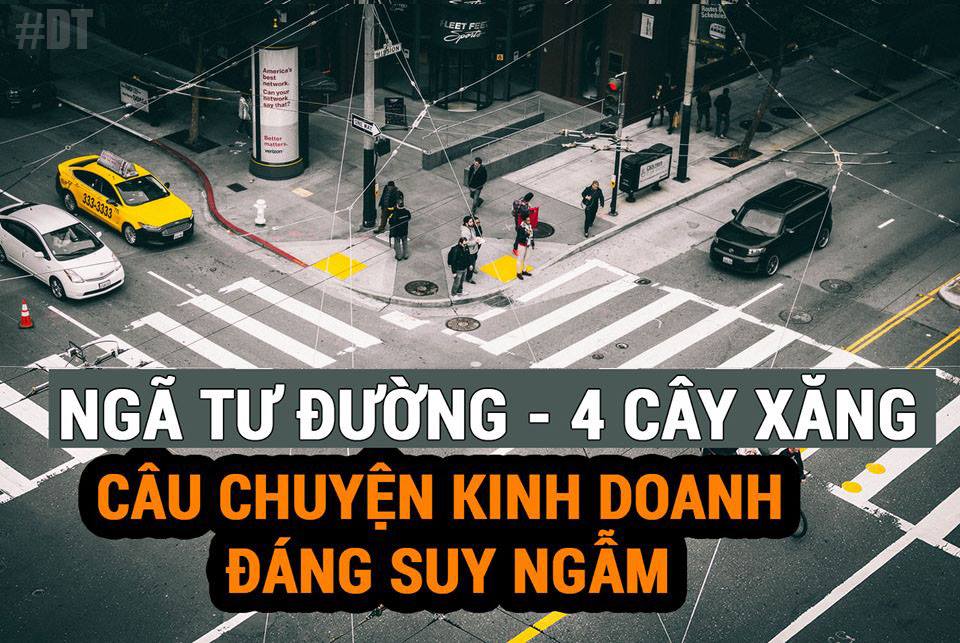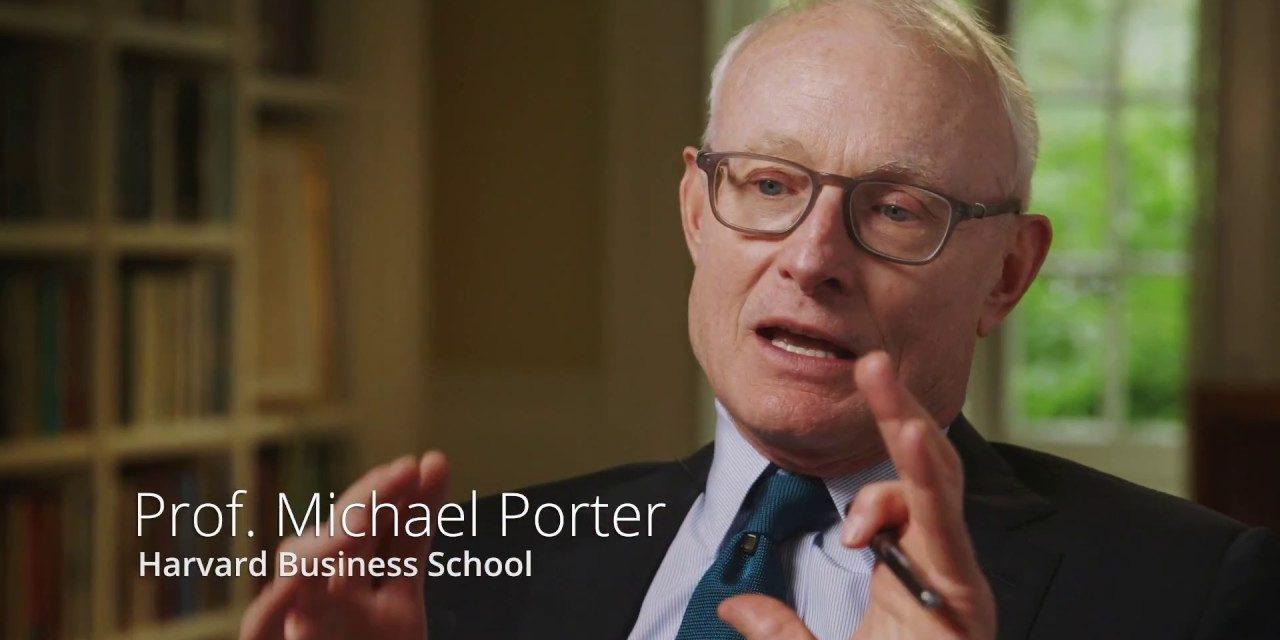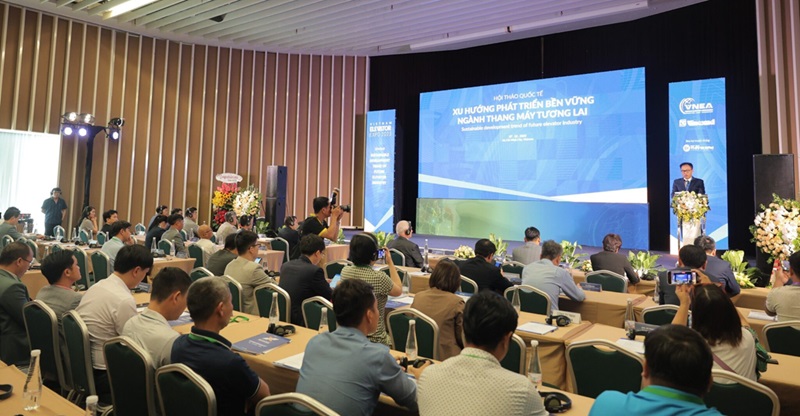The market is like a battlefield, that saying is not wrong when it comes to the level of fierceness that each business will have to face when participating in the game. That battlefield is the fight for market share for your business to survive and develop. But is the real competitor of the business like that?
What does competition do when all lose?
You must have heard the story of the crossroads and the four gas stations? The story goes that an American man came to a crossroads. He decided to open a gas station. Vehicles passing by find it convenient to drop in and support. A Russian guy came over to fill up gas, saw that this place was fine, so he opened a car repair garage to serve those who came to fill up in need. A Jewish brother, coming to the intersection, saw a lot of potential traffic, so he opened a restaurant. A Japanese invested in building a hotel at the other corner of the intersection. Soon, the crossroads became a busy place, rich, people live happily, cooperate with each other happily. A Vietnamese man knew this, and when he returned home, he immediately chose a crossroads to open a gas station. The traffic was so crowded that they stopped to fill up with gas to the point that they couldn’t even serve them in time. Another person saw that, so he opened a gas station on the opposite side and sold it a little cheaper to attract customers. Then another brother saw the opportunity to make money at the crossroads so clearly he also opened a gas station with a more competitive price than the other two. Customers now run to the cheapest gas station. Then a fourth gas station at the remaining corner of the street also sprang up to sell at a cheaper price to attract customers… In the end, the owner of the first gas station had not yet recovered his capital and went bankrupt. The owner of the second gas station is also on the edge of the abyss. The owner of the third gas station was bitter and had a conflict with the rest of the guys, and he couldn’t do anything. The owner of the cheapest gas station was arrested by the police for mixing fake gasoline to devalue the market.

This is just a funny story but with a clear message: If businesses see each other as enemies, rivals and use the same or similar business methods to compete. At that time, businesses are bringing themselves into an unnecessary war that no one else will suffer. No one wins in this unwise race.
According to statistics from the Department of Occupational Safety (Ministry of Labour, Invalids and Social Affairs), there are currently about 300 enterprises manufacturing and trading elevator-related products and services. The actual number will probably be much larger, in which most of the domestic elevator product distribution, joint ventures in the low price segment. Businesses try to win the market by racing on prices. This will lead to businesses being forced to lower costs right from the stage of choosing the cheapest parts, accessories and equipment. There are even many “fake goods”, equipment of unknown origin; lack of CO, CQ… And then the market war continues. Genuine businesses themselves are severely affected. Businesses that lack integrity will also “go bullet for bullet” with each other and then many fall into losses, bankruptcy, even related to the law.
It shows: The most dangerous thing is that we are not seeing who our real enemy is.
Don’t be stupid to turn the marketplace into a battlefield!
My friend is residing in the US, and is the founder of a startup business in the telecommunications industry. For the West, businesses uphold the principle of “win – win”. Meanwhile, another friend of mine who opened a business in Vietnam is always fascinated with the slogan like self-energizing every day: Market is the battlefield!
Not all of them are equated, but it is clear that the business culture of many Vietnamese people has made the image of entrepreneurs, businesses and our brand “lost”. What do we think when Vietnam’s export shipments to foreign countries are returned because the next batch is “not the same” as the previous batch. Or is it the dirty media campaigns of the evil hands behind the scenes that seriously damage the traditional fish sauce brand. Not to mention the acts of unfair competition between businesses in the same elevator industry such as smearing, infringing on business secret information, counterfeiting brands… are as common as muck.
And like that, the money that businesses earn will be tinged with many tricks, unethical, even blood. We call it “bad” profit, unsustainable.
Let’s compete with a strategy of differentiation instead of imitation
There are many similarities between the marketplace and the battlefield that we can easily recognize. If you want to win on the battlefield, you need to keep the land, especially the strategic area, and have the support of the people. If you want to win in the market, the key point of the business is to capture market share, especially market share with products that bring high added value, attract and retain customers to use the product. , its service.
But the marketplace is “sweat, boiling tears” and the battlefield is forced to “bleed blood”. Therefore, if we insist on treating the marketplace as a battlefield, there will inevitably be disputes, victory and defeat, glory and failure, wealth and poverty, happiness and suffering. If businesses still compete in the “imitation” style, in the end, the “total effort” will still be zero, no one will benefit. Even the scene of Vietnamese businesses in a state of “fluff” and maybe there are foreign competitors who are watching and then “when rogues fall out, then honest men come by their own” (?!)
Professor Michael Porter – Strategic thinker, father of the theory of competitive advantage between countries when coming to Vietnam for the first time in 2008 shared that: “Competition is doing something unique and different. You can make money by imitating, but it won’t last long because sooner or later you will be imitated. When everyone is doing the same thing, no one wins.” He argues that when companies go head-to-head, copying each other will reduce customer choice. Then the profit of one unit is the loss of the other. When a business is in that state, profitability is very low and businesses all suffer.

Business strategy is how businesses make a difference
That said, instead of “imitating business methods”, finding clever tricks to overcome competitors, “devil schemes” to deceive authorities and consumers, businesses choose to behave differently. It is about creating more unique and creative business models. It is the development of niche markets, opening new and unprecedented directions.
If you have a strategic vision, you must always ask yourself the question: What will it be like ten years from now and what will you do next?
What we will do?
Inherit and develop existing things to create a launching pad for the business towards higher goals. The product will need to be better, even the best at every moment in the segment. Service quality measures touch points with more information, thereby shortening the distance from the business to the customer’s heart. It is constantly building good cultural values to portray the brand as a belief in the community.

Elevator is a young industry with a lot of room in the Vietnamese market. The number of enterprises participating in this field is still growing, promising a competitive and dynamic business and production environment.
In fact, the resources of each business have certain limitations. It can be in terms of capital, human resources, production and business system management… No business is perfect and the story of “Saint Giong” is very difficult to happen in the current context. So are we going to spread that resource across all fronts or will we focus the spearhead on the target markets?
What if businesses in the elevator industry sat together to have a common voice, a common vision and a common mission. It is the unification of the standardization of human resources in the industry, the connection and reciprocity of enterprises, the promotion of the elevator supporting industry, the search for a qualified and qualified organization to lead the businesses deeply participate in the global supply chain… This is also the way each business contributes to creating a “healthy ecosystem”, helping businesses develop sustainably, and customers benefit.
Shaking hands does not mean to manipulate the market but to “Win – Win”, win for all./



